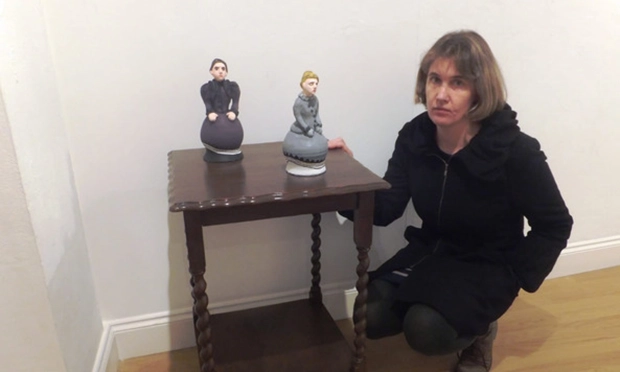Hackney artist’s schizophrenia drug could have caused heart problems, inquest into her death hears

Local artist Sophie O’Neill, who died in December 2019. Photograph: O’Neill family / courtesy Leigh Day Solicitors
An inquest into the death of a Hackney artist who was being treated for schizophrenia heard that a rare side effect of the drug she was taking can affect the heart.
Sophie O’Neill was admitted to A&E at the Homerton Hospital in December 2019 after suffering a mental health relapse.
The inquest heard the 37-year-old had missed several days of her medication, Clozapine, and had to be monitored because of its potential side effects.
O’Neill was a trustee of Hackney-based charity Core Arts and had a masters in public sculpture.
She had been treated with Clozapine for nearly a decade.
The inquest heard she was very withdrawn when she was admitted to the mental health unit, run by East London NHS Foundation Trust (ELFT).
Hospital pharmacist Poonam Divani explained how patients on Clozapine have regular blood tests and are closely monitored by a company.
The drug is considered high risk. It can cause high blood pressure and a risk of seizures. In rare cases, patients can develop myocarditis, or an irregular heart rate, the inquest heard.
Symptoms can include palpitations, a racing heart, flu-like symptoms or shortness of breath.
Divani said she consulted guidelines and the monitoring company before advising doctors about the new dose for O’Neill when she was admitted.
She said the dose could be increased by 50 per cent on the first day, by 75 per cent the following day, and by 100 per cent on the third day.
Staff had to do extra monitoring checks as O’Neill restarted on the medication.
Consultant psychiatrist Dr Fatema Ibrahimi told the inquest she did not know if junior doctors had specific training on the side effects of Clozapine.
She told the inquest at Bow coroners’ court that it could be “helpful” if they had more training on the drug.
Clozapine is not a first line drug for treatment of schizophrenia and is usually used after other treatments have been tried.
Dr Ibrahimi treated O’Neill when she was admitted twice in 2014 and again in 2018 and said she had schizophrenia, with symptoms of feeling negative and being withdrawn from family and friends when she felt unwell. She had also missed doses of Clozapine in the past.
Dr Ibrahimi said although the artist had “episodes where she was very unwell”, there were times when she was well and her symptoms were controlled, she communicated clearly and lived independently.
When she first saw O’Neill the day after she was admitted, she wanted more details about the amount of time she had a reduced dose of her medication and by how much it had been reduced.
She told the inquest she did not know that a routine ECG or echocardiogram was not done on admission.
Her long-term plan was to increase the dose of Clozapine to the level O’Neill was taking when she had been well.
She said her main concern was for the amount of food and fluid O’Neill consuming was taking, and to keep an eye out to prevent dehydration.
O’Neill’s blood test taken in A&E was normal.
Dr Ibrahimi said she needed prompting to eat and drink by her mother, who was a regular visitor, along with staff.
Seven days later, O’Neill’s pulse rate rose to 122 and Dr Ibrahimi said she would expect nursing staff to contact doctors about it.
The medical team received an email outlining concerns that Ms O’Neill had not been eating and tests showed she was dehydrated.
Staff arranged for her to get fluids at the Homerton Hospital day unit and then return to the mental health unit where she was drinking, with prompting from nurses.
Overnight on 18/19 December, her blood pressure and oxygen saturation rate were low, and her heart rate had risen.
Doctors advised keeping her under observation and withholding Clozapine. They thought she could have a respiratory infection.
Dr Ibrahimi said she was not told what happened overnight at the morning handover.
Earlier, she told the inquest the unit was short-staffed.
She said she would have asked for more blood tests because O’Neill was on Clozapine.
The following night, O’Neill had a high pulse rate and Dr Ibrahimi did not know about it at handover on 20 December.
She said if she had known about the observations, she would have asked for a troponin test, a protein which is present when people have heart problems, and taken further action depending on the results.
She told the inquest she was aware of the link between Clozapine and myocarditis: “If I had been informed about the high pulse rate and high blood pressure, I would have wanted to refer her.”
O’Neill did not get up to see her during the ward round and Dr Ibrahimi said it “did not worry me”.
O’Neill’s mother has told the inquest her daughter was “incredibly sleepy” that day.
She died the following day and Dr Ibrahimi said she was “incredibly shocked and saddened”.
Her first thought was she could have had a pulmonary embolism, or deep vein thrombosis, which can cause the sudden death of young people.
The inquest continues and is expected to last two weeks.
